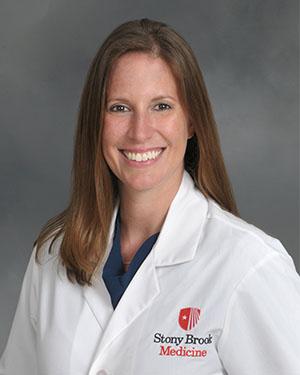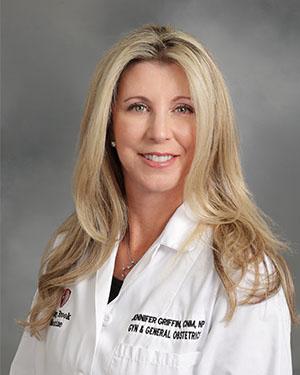Navigation Pediatric and Adolescent Gynecology
Pediatric and Adolescent Gynecology
Teens and children are not small adults. If they require gynecological care for any reason, they also need doctors and other health care providers trained to understand their unique emotional and physical needs.
In our division of Pediatric and Adolescent Gynecology, we specialize in offering compassionate, non-judgmental, skilled gynecological care for children through young adults.
Many are surprised to hear the words 'pediatrics' and 'gynecology' in the same sentence. In fact, gynecologic concerns can and do arise in infancy, childhood and adolescence. While there is some overlap, the problems and needs of this population are often different from those encountered in an adult gynecology practice. In fact, many adult gynecologists do not see young adolescents and children. Similarly, many pediatricians do not feel adequately equipped to manage more complex gynecologic problems requiring medical or surgical treatment. This is where a Pediatric and Adolescent Gynecologist becomes important.
Services
Pediatric and Adolescent Gynecology (PAG) is a subspecialty within Obstetrics and Gynecology that focuses on reproductive health in patients from birth to young adulthood. Our division was created to address the special needs of patients in this age range because their gynecologic and emotional needs are distinct from those of adults.
We understand that talking about gynecologic problems can be especially difficult, frightening or embarrassing for young patients, and that evaluation and treatment require a sensitive approach individualized to each patient and their family.
Our gynecologists provide compassionate, age-appropriate care for conditions such as, but not limited to:
- Irregular, heavy, or painful menses
- Ovarian cysts
- Vulvovaginal problems
- Abnormal pubertal development (early or delayed puberty)
- Abnormal anatomy of the reproductive tract
- Amenorrhea (lack of menses/period)
- Polycystic Ovarian Syndrome (PCOS)
- Gynecologic consequences of cancer treatment and fertility preservation
Our Team

Stefanie Cardamone, MD, FACOG
As a gynecologist who specializes in Pediatric and Adolescent Gynecology (PAG), Dr. Cardamone sees patients with a wide range of medical and surgical problems. Some conditions such as abnormal puberty or menstrual disorders (heavy, painful or missing periods) can be treated with medications.
Other times, surgery is needed for ovarian cysts, endometriosis, or developmental abnormalities of the hymen, vagina or uterus. Dr. Cardamone also sees patients with other medical conditions that can have effects on gynecologic health, such as following treatment for cancer. This breadth of common and rare conditions is one aspect of care that she loves most about PAG.
Talking about gynecologic problems can be especially difficult, frightening or embarrassing for young patients. Evaluation requires a sensitive, age-appropriate approach that’s individualized to each person. One of the challenging but most rewarding parts of Dr. Cardamone’s job is helping young people understand their bodies, and to feel empowered and confident in discussing and prioritizing their reproductive health.

Jennifer Griffin, CNM, NP, MS
After graduating from nursing school, Jennifer completed her midwifery and women’s health clinical training at the Naval Hospital Twentynine Palms in California. She then worked in an indigent high-risk population in South California before returning to New York.
She joined the faculty at Stony Brook in 2002 where she has focused her care on well women. Jennifer has had a longstanding interest in the care of adolescents, contraceptive care and diseases of the vulva/vagina. She is also an expert in the care of women with HIV.
Locations
East Setauket Pediatric and Adolescent Gynecology
140 Belle Mead RoadEast Setauket, NY
Bohemia Pediatric and Adolescent Gynecology
4875 Sunrise Highway, Suite 200Bohemia, NY
FAQs
Patients who are about to see a gynecologist for the first time may have a lot of questions. At your visit, you’ll have the opportunity to ask us whatever you'd like. In the meantime, here are some answers to common questions that our patients have.
There’s no “right age.” Anyone of any age with a gynecological problem or concern can and should see a gynecologist. But, according to the American College of Obstetricians and Gynecologists, a good time for a first visit would be when you’re between the ages of 13 and 15.
Depending on your age and your concerns, your first visit may just involve a talk with your doctor. Your doctor will ask about your health, family history, and medical history and answer any questions you have. You’ll also learn how often you should have future exams.
It’s very normal to be nervous or embarrassed. A visit with a gynecologist can include talking about topics that feel uncomfortable. For example, you may be asked what your periods are like or if you are having sex with anyone. It is important to know that, although these conversations might feel personal, having them honestly with your doctor is important to keep you healthy.
Sometimes an examination is recommended, which might include parts of your body that you may be accustomed to keeping private. We hope that it helps you to know that we see thousands of patients every year and have heard and seen everything related to gynecology. Our goal is to make sure all of your body is healthy and we are here to care for you with kindness and compassion.
Many young people do not need an internal exam, also called a pelvic exam. Instead, your doctor may do a general physical exam as well as an external genital exam to check for normal development. However, sometimes a pelvic exam is recommended, for example, if you have unusual pain or bleeding. A parent or guardian can be present for any examinations needed if you choose.
In some cases, a pelvic (transabdominal) ultrasound can also be used for an examination. The technician will spread a clear, gel-like liquid on your belly and place a scanning instrument on your skin that uses sound waves to take “pictures” of your internal organs. You may feel a little pressure as the technician moves the scanner around.
This tends to be the part of the visit that concerns young patients the most. And even though you probably won’t need one for a while, it’s good to know what happens during this type of exam.
During a pelvic exam, the doctor starts by examining the vulva, the outside parts of your genitals. Next, an instrument called a speculum is placed in your vagina. The speculum opens the walls of the vagina and keeps them open during the exam. Once the speculum is placed, the doctor will be able to examine the walls of your vagina as well as your cervix.
If you need a Pap test, which tests for abnormal cells and is usually done when you’re around 21 years old, the doctor will use a tiny brush to collect a few cells from the cervix, which will be sent to a lab for examination.
Another part of a pelvic exam is a quick check of your internal organs. To do this the doctor gently places one or two gloved, lubricated fingers into your vagina up to your cervix while pressing down on your abdomen.
To help make the exam more comfortable for younger patients, our doctors use smaller instruments and different techniques than are used for adults. Your doctor will also take as much time as you need to feel at ease.
You may receive care or treatment for any medical issues you have. These may include prescription medicines that you take by mouth or topical medicines that you apply to your body.
You may also receive a vaccine to help prevent HPV (Human Papillomavirus). This is a very common virus that can lead to certain types of cancer later in life. Getting the proper dose of the HPV vaccine for your age can protect you from developing the cancers that HPV can cause.
If you are having sex, you may also have tests done for certain sexually transmitted infections (STIs).
Yes, and in fact, we encourage a portion of your visit to be private. We understand and respect that you may want to discuss things with your doctor that you don’t want a parent to know about.
Even if a parent comes to your visit and is part of the initial conversation, you will be given the time to have a confidential discussion with your doctor. The doctor will ask your parent to wait outside.
You can discuss pretty much anything concerning your reproductive health, which can include your emotional health too. You can discuss cramps or problems with your period, sex, birth control, mood changes, hormonal issues, sexually transmitted infections, weight loss or gain, gender identity, changes to your body and skin, and more.
What’s really important to remember is that your visit with us is intended to make you feel cared for and to relieve any embarrassment or nervousness you may have.
Additional resources you may find helpful include:
- The Care and Keeping of Your: The Body Book for Younger Girls (American Girl Library)
- Celebrate Your Body (And Its Changes, Too!): The Ultimate Puberty Book for Girls, by Sonia Renee Taylor
- Our Bodies, Ourselves (Boston Women’s Health Collective)
Advances and Recognitions
Integrated Care and Fertility Preservation Program
The Integrated Care and Fertility Preservation Program at Stony Brook Children’s is the only program of its kind in Suffolk County specifically designed with children, teens and young adults in mind.
A collaboration between Pediatric and Adolescent Gynecology, Pediatric Hematology/Oncology, Pediatric Surgery and Reproductive Endocrinology, the program is designed to improve the fertility and reproductive health of patients receiving chemotherapy, radiation and/or surgery that may impact fertility. The program encompasses fertility preservation care for newly diagnosed and relapsed patients, and also reproductive health for patients both at diagnosis and in survivorship.
Research and Education
Education and research are core components of Stony Brook Medicine’s Pediatric and Adolescent Gynecology Program.
Our team members are faculty of the Renaissance School of Medicine at Stony Brook University. Nursing students, senior medical students, and resident physicians in Obstetrics and Gynecology rotate through our service and participate in clinical care. During this time, students and trainees learn about the diagnosis and management of important gynecologic conditions in children and teens, and gain experience in providing developmentally appropriate gynecologic care.
Dr. Cardamone also regularly participates in resident education through lectures, as well as medical simulation. The Pediatric and Adolescent Gynecology curriculum includes core topics such as prepubertal gynecologic conditions, abnormal puberty, menstrual disorders and adolescent endometriosis. Simulation is used to teach pediatric examination and surgical techniques and to allow trainees to practice in a safe environment.
Additionally, our team participates in research studies on HIV, fertility preservation and utilizing simulation in medical education.
Definitions
Foul-smelling and/or thick or discolored fluid or material that comes from the vagina. Normal vaginal discharge is typically a thin, liquid-like substance that’s clear or milky with a mild odor or no odor.
The end of the uterus can be seen during an internal examination of the vagina.
Another term for periods.
A sac containing fluid that develops in the ovary. Most cysts don’t cause any problems and go away on their own, while others require treatment.
A test in which cells are collected from the cervix and examined under a microscope.
An examination of the reproductive organs.
An instrument doctors use to hold open the walls of the vagina during an examination.
These are infections that are spread from one person to another through sexual contact.
A tube-like structure in the body that leads from the uterus to the vulva.
The portion of your genitals outside your body.
